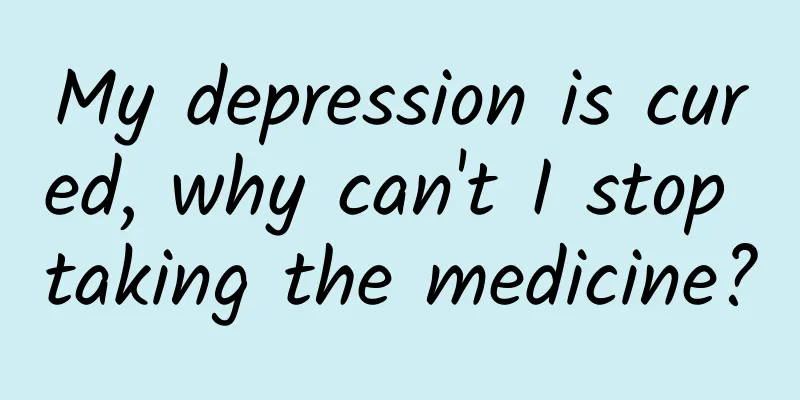My depression is cured, why can't I stop taking the medicine?

|
This is the 4832nd article of Da Yi Xiao Hu Seven months ago, Mr. Li had a bad mood, sometimes sighed, had no interest in doing things, did not want to go to work, did not want to go out, liked to lie at home, did not like to socialize, ate less than before, had poor sleep at night, went to the hospital for treatment, and was diagnosed with "depressive disorder". He was prescribed medication for treatment, and felt almost better after taking the medication. So last time when his family asked if he could stop taking the medication, the doctor said that he could not stop taking the medication at the moment. Mr. Li couldn't understand why he couldn't stop taking the medicine when he was almost recovered. Did they want him to take medicine for the rest of his life? So he came to the hospital for consultation. What is the duration of medication treatment for antidepressants? Antidepressant treatment requires adequate doses and a full course of treatment. The drug dosage must be within the effective therapeutic dose range. Too low or too high a dose is not advisable. The full course of treatment for depression can be divided into: ① Acute treatment, which takes 6 to 8 weeks; ② Consolidation treatment, after the symptoms are relieved, in order to prevent the recurrence of the disease, at least 4 to 6 months of consolidation treatment is required. In principle, the drugs that are effective in the acute phase of treatment continue to be used, and the treatment dose remains unchanged; ③ Maintenance treatment, used to prevent the recurrence of the disease. Why maintenance treatment? Depression is a highly recurrent disease, so maintenance treatment is required to prevent relapse. After maintenance treatment, the condition is stable and the medication can be slowly reduced until treatment is terminated, but early signs of relapse should be closely monitored. There are different opinions on the duration of maintenance treatment. Most opinions believe that maintenance treatment for a single depressive episode is 6 to 8 months; maintenance treatment should be given for those who have had more than 2 relapses, especially 2 relapses in the past 5 years. Maintenance treatment should be considered for adolescents with onset, accompanied by psychotic symptoms, severe illness, high risk of suicide, and a genetic family history. The duration of maintenance has not been fully studied, but it is generally at least 2 to 3 years. Long-term maintenance treatment is recommended for those with multiple relapses. What to note? Patients are generally advised not to end treatment before holidays, major events, or stressful events. When stopping drug treatment, the dosage needs to be gradually reduced over a few weeks to minimize the possibility of withdrawal reactions. Patients are advised not to stop medication suddenly and to carry medication with them when traveling or going out. When reducing or discontinuing antidepressants, slowly reducing the dosage or switching to antidepressants with a long half-life may reduce the risk of withdrawal syndrome. Before stopping treatment, doctors should inform patients of the potential risk of recurrence of depressive symptoms and a plan to seek treatment after identifying recurrence. The highest probability of recurrence is within 2 months after the end of treatment. After stopping the medication, patients should still be monitored and followed up for several months. If symptoms recur, patients should receive a full course of acute treatment again. In order to improve or avoid depressive episodes, maintenance treatment is required, regular outpatient check-ups are required, and the dosage of medication should be adjusted in a timely manner according to changes in the condition. Do not reduce or stop medication on your own. Stopping medication must be done under the guidance of a doctor. References: 1. Standardized Manual of Medication for Depression, edited by Liu Shanshan, People's Medical Publishing House, 2017. 2. "Guidelines for the Prevention and Treatment of Depression in China, Second Edition", edited by Li Lingjiang and Ma Xin, Chinese Medical Electronic Audio-visual Publishing House, 2015. Author: Shanghai Fengxian District Mental Health Center Psychiatry Department Attending Physician Wang Chunlian Wang Jinde Attending Physician |
<<: World Tuberculosis Day: How to win the battle against tuberculosis?
>>: How can long-term drivers prevent lumbar disc herniation?
Recommend
Is eyebrow tattooing or eyebrow embroidery better?
For many women, they want to make their image mor...
What are the consequences of removing the ovaries?
Ovaries are very important to every woman. The bo...
9 common residual symptoms after turning negative, when should you seek medical attention? Check yourself now!
Some people may still have some symptoms after a ...
Acupuncture treatment for asthma
This is the 3539th article of Da Yi Xiao Hu Many ...
Pregnant woman farts
My stomach is rumbling and I feel like I'm go...
How big is an ovarian cyst that requires surgery?
Ovarian cyst is a disease that many women have. I...
What causes unbearable itching at the vaginal opening?
Many women will experience vaginal itching, which...
Treatment for premenstrual pain
Premenstrual abdominal pain brings great torture ...
Wearing these pants during menstruation will inevitably cause gynecological diseases
As a woman, you will encounter gynecological dise...
How long is the head and arm of a three month old fetus?
A woman's pregnancy period is divided into th...
World Hearing Day | Bu Xingkuan: Working towards healthy ears and hearing for everyone
Hearing and language are important means for huma...
Will ovulation still occur after vasectomy?
In daily life, there are many methods of contrace...
The harm of plastic smell to pregnant women
Plastic is everywhere in our lives, such as the p...
What is the fastest breast enlargement secret?
I believe that breast enhancement is a topic that...









